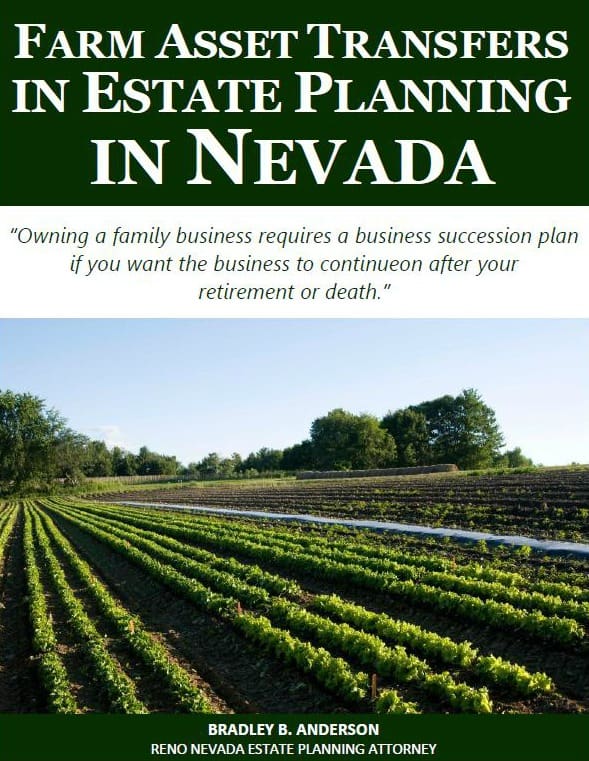The proper estate plan can answer the most important questions, not only for your other relatives, but also for the court, if you are no longer there to take care of your young children. Learn more about Nevada estate planning for families with minor children in this presentation.
 A trust is more than just a way to avoid probating an estate. There are many benefits, such as the ability to protect your property for your heirs, and reduce the amount of estate taxes that will be incurred. A trust also helps you to prepare for the possibility of incapacity, and to avoid a potential will contest. For clients who agree that a trust is a good option, the next question is usually about the annual fees for a trust in Nevada. There are several factors that determine what the costs may be.
A trust is more than just a way to avoid probating an estate. There are many benefits, such as the ability to protect your property for your heirs, and reduce the amount of estate taxes that will be incurred. A trust also helps you to prepare for the possibility of incapacity, and to avoid a potential will contest. For clients who agree that a trust is a good option, the next question is usually about the annual fees for a trust in Nevada. There are several factors that determine what the costs may be.
Trustees are entitled to a fee for their services. How much they may be entitled to, can differ from state to state. Whether they will even charge a fee also depends on their relationship to you, in most cases. If the trust is a revocable living trust, you are likely your own trustee, so you obviously would not charge yourself a fee. Family and friends who have agreed to serve as your trustee in the event of your death, often turn down the fee, if they are beneficiaries in the trust, as well. On the other hand, if your trustee is a financial institution, such as a bank or trust company, it will likely have an established fee scheduled, depending on the type of services they provide to you.
On average, annual trust fees can run between one and two percent of the total value of the assets being administered. When a trust is not being supervised by the probate court, there are generally no limitations on what the trustee can be paid for his or her services. But, if you want to avoid disputes in the future, it is best to set the trustee’s compensation in the terms of the trust. That way, there can be no dispute between the trustee and the beneficiaries about the amount of the fees.
Typically, trusts are not created to be managed by a court. In the case of a testamentary trust (one created by a will that takes effect at death), or a trust that has been challenged in court, the probate court will order the trustee to be paid a “reasonable” fee. Nevada provides, by statute, for “reasonable compensation” (Nev.Stat. §153.070) and extra compensation is allowed for any “extraordinary services” (Nev.Stat. §150.030).
Courts have established that the following criteria can be used for determining reasonable compensation:
Nevada’s statute, § 153.070 (2013), provides as follows:
On the settlement of each account of a trustee, the court shall allow the trustee his or her proper expenses and such compensation for services as the court may deem just and reasonable. Where there are several trustees, it shall apportion the compensation among them according to the respective services rendered. It may fix a yearly compensation for each trustee, in a set amount or pursuant to a standard schedule of fees, to continue as long as the court may deem proper.
If you have questions regarding trust fees, or any other estate planning needs, please contact living trust attorneys at Anderson, Dorn & Rader, Ltd., either online or by calling us at (775) 823-9455.

Creating a comprehensive estate plan is one of the most important things you can do to protect the future of your loved ones. An appropriate plan allows you to remain in control of your finances, including how they are distributed, while sparing your loved ones from the frustration and expense of managing your affairs after your death.
An estate plan can include any number of tools for managing and protecting your assets, including life insurance policies. In fact, the importance of life insurance in estate planning should never be overlooked.
Click here to read the whole report or download the PDF.
 When couples go through a divorce, emotional and financial strain is often significant. Estate planning is probably the last thing on either person’s mind. Nevertheless, it is very important to revisit your estate plan after a divorce, as updating its provisions can save you a lot of unnecessary stress and complication in the future. Estate planning after a divorce is important if you want to ensure that your current wishes and plans are still reflected by its terms.
When couples go through a divorce, emotional and financial strain is often significant. Estate planning is probably the last thing on either person’s mind. Nevertheless, it is very important to revisit your estate plan after a divorce, as updating its provisions can save you a lot of unnecessary stress and complication in the future. Estate planning after a divorce is important if you want to ensure that your current wishes and plans are still reflected by its terms.
Important changes to be made following a divorce
There may be many specific terms that you will want to change following a divorce, but you may not know where to start. The first step, is to revoke your will or trust and create a new one. The changes you need to make to your will or trust involve your beneficiaries, your executor/trustee and a guardian for your minor children. These are the most important aspects of your estate plan that should be addressed after a divorce.
If you have a will already, it should be revoked and a new one drafted. If you do not have a will, it is time to make one. The same is true if you and your former spouse made a living trust together, which acts as a will, but does not need to go through the probate court.
Changing your beneficiaries
If you made your will or trust while you were married, most likely you left everything to your spouse. That is no longer the case, now. So, the first step is to identify new beneficiaries, as well as alternate beneficiaries, to inherit your estate. You may also want to reconsider any gifts to relatives of your former spouse (i.e., your in-laws).
Luckily, in most states, gifts to your former spouse are automatically revoked after a divorce. This may not be what you want, however, if you and your spouse parted amicably. Either way, you need to revisit your named beneficiaries to ensure that your current wishes are reflected.
Naming a new executor
Most people name their spouse as the executor of their estate. However, after a divorce, that should be changed. Just as you may no longer want your former spouse to inherit your property, you likely do not want your former spouse to be in charge of your estate. Similar to the revocation of gifts to former spouses, many states revoke the appointment of a former spouse as executor of a will, or trustee of a trust. If you named an alternate executor, that person will serve if possible. But, in case he or she is no longer available, it is important to change your executor now, and name a new alternate.
Choosing a guardian for your minor children
For couples with minor children, a crucial part of their estate plan is nominating a guardian for those children, in the event both parents pass away. Certainly, this is a difficult decision to make. The issue becomes much more difficult if the parents become divorced.
Most clients assume that, if they pass away while their children are still minors, the other parent will take care of them. While that is true in most cases, what if both parents pass away at the same time, or within a short time of one another. We cannot predict what may happen. In the event that your former spouse predeceases you, it is important to have a guardian nominated, in case something happens to you. If you and your former spouse can agree on who should be nominated, that is even better.
If you have questions regarding estate planning after a divorce, or any other estate planning needs, please contact Anderson, Dorn & Rader, Ltd., either online or by calling us at (775) 823-9455.
 Often, members of the gay community are concerned about privacy when it comes to how they choose to leave their estate to, after death. Indeed, privacy is a common concern for most clients. Since there are so many options in estate planning, you have the ability to customize your plan in a way that keeps your assets, as well as your plan for distributing them, as private as you wish. A major benefit of creating an estate plan, as opposed to relying simply on a will, is that the distribution of an estate can be kept from nosey neighbors and prying eyes.
Often, members of the gay community are concerned about privacy when it comes to how they choose to leave their estate to, after death. Indeed, privacy is a common concern for most clients. Since there are so many options in estate planning, you have the ability to customize your plan in a way that keeps your assets, as well as your plan for distributing them, as private as you wish. A major benefit of creating an estate plan, as opposed to relying simply on a will, is that the distribution of an estate can be kept from nosey neighbors and prying eyes.
Probate proceedings are always public
A major drawback of relying only on a will to handle the distribution of your estate is the fact that wills must be probated. This means that a will has to be filed with the local probate court. The only way the terms of a will can be enforced, or put into action, is through the court system. As a result, the specific details of your will become public record, including the identity of your beneficiaries, the amount of assets you have, and who you decide to give them to. Basically, once your will is filed in court, anyone can go to the probate court and ask to see it, and even obtain copies of your probate documents.
An estate plan using revocable living trusts provides privacy
There are many benefits to using revocable living trusts as part of your estate plan. One important benefit is the amount of privacy that this estate planning tool can provide. For instance, a revocable living trust is essentially a private contract between you and your chosen trustee. Because it is a living trust, you retain authority over the trust during your lifetime, including the power to make all decisions regarding the investment of your assets and the use of income earned by the trust. If you become mentally incapacitated, the trustee can then take over management of the trust. Of course, upon your death, your trustee will become the decision maker, based on the terms of your trust. Your trustee is always required to follow your instructions and distribute your assets as you indicate in the trust agreement.
Why does a revocable trust stay private?
The main difference between a will and a living trust is the fact that a trust is not required to be filed in court. Your instructions are followed immediately upon your death or incapacity, without your estate going through the probate process. It is the probate process that makes your estate open to the public. Therefore, only your trustee has access to its terms.
If you have questions regarding privacy in estate planning, please contact Anderson, Dorn & Rader, Ltd., either online or by calling us at (775) 823-9455.
 Some clients ask, often with apprehension, whether they will have to deal with a paralegal. In reality, the benefits that a well-trained estate planning paralegal can bring to the attorney-client relationship are many. While not every law firm has paralegals on staff, many do. A paralegal’s value, especially in probate matters, can be substantial. More importantly, dealing with a paralegal on any type of legal matters, does not mean that clients will not work with their attorney.
Some clients ask, often with apprehension, whether they will have to deal with a paralegal. In reality, the benefits that a well-trained estate planning paralegal can bring to the attorney-client relationship are many. While not every law firm has paralegals on staff, many do. A paralegal’s value, especially in probate matters, can be substantial. More importantly, dealing with a paralegal on any type of legal matters, does not mean that clients will not work with their attorney.
Initial evaluation of the needs of the client
The initial meeting with a client is critical and should be attended by the attorney. Paralegals are very helpful when it comes to gathering all relevant information from the client, as well as providing the types of services the attorney determines is required for the client, based on his or her needs. A well-trained paralegal knows the documents and services for the client once the determination is made by the attorneys. After the initial consultation, paralegals will create and manage a customized calendar of important dates relevant to the client’s case, prepare documents, stay in touch with the client to make certain all necessary information is gathered and deadlines are met.
Paralegal as liaison
A paralegal’s job is often to be the liaison between the client and attorney. Why is this a good thing? Because attorneys have great demands on their time and a paralegal can help make communication between attorney and client more efficient.
Creating an inventory for probate matters
Probate paralegals, in particular, assist in filing the asset inventory with the court, as required. They are generally responsible for collecting asset information from the client and then drafting the actual inventory document to be filed. Paralegals can also evaluate assets, at the time of the decedent’s death, to determine any alternate valuation date that may apply.
Handling legal documents
Probate paralegals are specially trained to prepare and file most, if not all, of the documents required for the administration and closing of an estate in probate. Paralegals, with the supervision of the attorney, are capable of interpreting the provisions of wills and handling all aspects of surrendering life insurance and other death benefit claims. Taking care of these matters is very useful for the attorney and the client, as many tasks can be completed in a very efficient manner.
Evaluating creditor claims
Once a decedent’s creditors have been notified of the death, the paralegal will review any claims submitted by creditors to determine whether they are legitimate. The paralegal also keeps the financial records for the estate, verifies bank balances and prepares estimates for paying estate taxes, as necessary. They can then create the first draft federal estate tax returns and state inheritance tax returns, to be completed by the attorney and/or accountant, if required.
Non-probate related matters
Paralegals are also very useful in other areas of estate planning. They are often trained to handle the drafting of wills, trusts, documents needed for establishing guardianships, conservatorships, and many other estate planning documents. Paralegals are capable of drafting real and personal property sales documents, and power of attorney documents, among many other essential estate planning documents.
Paralegals are always supervised by attorneys
A paralegal’s work is always reviewed by the estate planning attorney for whom the work is being performed. As a paraprofessional, it is actually required that they work under the direct supervision of a licensed attorney. Similar to physician assistants and teaching assistants, paralegals are trained to assist the attorneys, who have more extensive training in the field. You can be certain that, if you work with a paralegal in our office, you will be receiving the top notch service we guarantee.
If you have questions regarding probate work, or any other estate planning needs, please contact Anderson, Dorn & Rader, LTD either online or by calling us at (775) 823-9455.
 Selecting the right trustee is very important. A trust is an agreement between you and your trustee, who will ultimately be in charge of your assets and your personal affairs. The trustee is responsible for making sure the terms of your trust are being followed. The duties of a trustee typically include handling your financial affairs by paying your bills, making investments and maintaining accurate records of your finances. Clients ask if: can my attorney be my trustee? Choosing your estate planning attorney to be the trustee of your living trust is an option you should consider.
Selecting the right trustee is very important. A trust is an agreement between you and your trustee, who will ultimately be in charge of your assets and your personal affairs. The trustee is responsible for making sure the terms of your trust are being followed. The duties of a trustee typically include handling your financial affairs by paying your bills, making investments and maintaining accurate records of your finances. Clients ask if: can my attorney be my trustee? Choosing your estate planning attorney to be the trustee of your living trust is an option you should consider.
Is it a good idea to name my attorney as my trustee?
An attorney is always a good choice when you need someone to provide fiduciary services, such as a trustee. Attorneys have specialized skills and experience that can be a great value to clients. Also, the attorney who drafted the trust document is already intimately familiar with its terms, as well as the family and financial situation of the client. If necessary, your attorney can always obtain assistance with investment management by hiring an investment professional.
What are the ethical considerations?
There are no inherent ethical or legal issues that would specifically prevent an attorney from serving in the capacity of trustee. The normal ethical considerations that every attorney must take into account, while serving as a fiduciary to his or clients, still exist. There are often disclosures that need to be made to a client, so that attorneys can prevent certain conflicts of interest from occurring. Your estate planning attorney will be very familiar with the professional ethics requirements in this area, and should be able to prevent any problems before they start.
Attorneys are required to exercise professional judgment
When an attorney takes on the task of creating a trust for a client, it is proper for the attorney to inform the client of his or her own availability to serve as trustee. It must be presented as merely another option the client is allowed to consider. Yet, the attorney must not allow self-interest to interfere with his or her duty to recommend the best choice of trustee to the client. Care must also be taken to avoid violating the ethical rules regarding solicitation of clients and entering into a business relationship with a client, as these rules are set out by each state’s local bar.
Informed consent is usually sufficient to avoid ethical problems
As long as the attorney ensures that the client has received sufficient information to provide “informed consent,” there should be no problems with an attorney serving as trustee. “Informed consent” simply means that the attorney communicates to the client all possible risks and all available alternatives. When the client understands this information, but agrees to the proposed course of conduct, such as service as trustee, that clients has given “informed consent.”
If you have questions regarding trusts, trustees, or any other estate planning needs, please contact Anderson, Dorn & Rader, Ltd., either online or by calling us at (775) 823-9455.

When it is time to start planning for the care of your pet after your death, you have several estate planning options, ranging from provisions in your will, to a complicated trust.
Topics covered in this whitepaper include:
Click here to read the whole article or download the PDF.
When it is time to start planning for the care of your pet after your death, you have several estate planning options, ranging from provisions in your will, to a complicated trust. Learn more about the advantages and disadvantages of Nevada pet trusts in this presentation.

Owning a family business requires a business succession plan if you want the business to continueon after your retirement or death.
Topics covered in this whitepaper include:
Click here to read the whole article or download the PDF.
 A family pet is not only a friend for life, but your cat or dog may become as much a part of your family as any other member. As such, pet owners are understandably concerned about what will happen to their pets after they pass away. It is unfortunate that pets cannot simply be named as beneficiaries, because that would make pet planning so much easier. But, since pets cannot own property, you will need to establish an appropriate pet plan to protect the future of your family friend. Your estate planning attorney can guide you in this process, so you will know what to include in a pet plan.
A family pet is not only a friend for life, but your cat or dog may become as much a part of your family as any other member. As such, pet owners are understandably concerned about what will happen to their pets after they pass away. It is unfortunate that pets cannot simply be named as beneficiaries, because that would make pet planning so much easier. But, since pets cannot own property, you will need to establish an appropriate pet plan to protect the future of your family friend. Your estate planning attorney can guide you in this process, so you will know what to include in a pet plan.
What are my pet planning options?
There are two main components of every pet plan: the caregiver and financial support. The goal of your pet plan should be to appoint a proper caregiver to care for your pet and make sufficient funds available for that care. There are three basic types of pet plans, ranging from the formal to the informal; from simple agreements to complex trusts.
The general provisions of a good pet plan
A comprehensive pet plan allows you to provide detailed instructions for the care of your pet, including your preferences and your pet’s preferences. The ability to add any instructions you would like, gives you peace of mind for the future. In order to cover all of the necessary provisions, there are four topics that should be included in your pet plan.
Appointing a caregiver to care for your pets
Your pet plan needs to specifically identify the individual you want to provide care for your pet, after your death. It is also wise to name an alternative caregiver, in case your initial choice is unable to fill the role for whatever reason.
Instructions regarding your pet’s needs and routines
Describing your pet’s normal routines and certain preferences, such as type of food, favorite toys, etc., can ensure your pet’s continued happiness. It may also be important to include information regarding your pet’s veterinary care, pre-existing medical issues, dietary restrictions, and the like.
Source of funding for the care of your pet
Establishing a source of funding for your caregiver to use in providing care for your pet is obviously a crucial component of a pet estate plan. Your estate planning attorney can help you to estimate the amount of funds needed to cover your pet’s expenses. This sum of money should be placed in trust, so that the funds can only be used for that purpose. Many clients also include instructions on what should be done with any funds that may be remaining after your pet’s death.
Appointment of a trustee over the funds
The role of the trustee in pet planning is to ensure that your instructions are being followed and that the money you set aside for your pet’s care is being used only for that purpose. The trustee can be the same individual you select to be the caregiver, or it can be a separate individual, if you would be more comfortable with a system of checks and balances.
If you have questions about creating pet plans, or any other pet estate planning needs, please contact Anderson, Dorn & Rader, Ltd., either online or by calling us at (775) 823-9455.
Dying “intestate” means that you did not create a plan for how your estate should be handled upon your death. When you have no plan, the probate court will determine how to handle your assets, based on the laws of intestate succession.
Learn more about intestate succession in Nevada in this presentation.
In Nevada, if the deceased person's assets exceed $20,000, or if there is real estate involved, probate is normally required.
Topics covered in this whitepaper include:
Click here to read the whole article or download the PDF.
 Contrary to what many people believe, trusts do not inherently protect assets. The amount of protection a trust can provide for your assets depends on how the terms are written. Some types of trusts can, indeed, protect your assets from creditors. However, not every trust can. Irrevocable trusts and asset protection can go hand in hand, if the trust is properly established.
Contrary to what many people believe, trusts do not inherently protect assets. The amount of protection a trust can provide for your assets depends on how the terms are written. Some types of trusts can, indeed, protect your assets from creditors. However, not every trust can. Irrevocable trusts and asset protection can go hand in hand, if the trust is properly established.
Which type of trust can provide asset protection?
Protection from creditors can be accomplished to some degree with trusts, if it is an irrevocable trust. “Irrevocable” means the trust cannot be modified or revoked once it is created. Since you no longer control the property, and it cannot be revoked, the money is no longer considered to be yours. As such, that property is no longer subject to your creditors.
What are the proper terms to include for asset protection?
As with anything else you want to accomplish, the proper terms or provisions in a trust can ensure asset protection. First of all, the interest you leave to your beneficiary must either be contingent on some future event, or be subject to the sole discretion of the trustee.
Another option is to include, what is known as, a “spendthrift” provision. This type of provision keeps creditors from making a claim against a beneficiary’s interest. Just remember that the assets are only protected by these types of provisions, as long as the assets remain in the trust. Once they have been transferred out of the trust, they become subject to a creditor’s claim.
What is the difference between a revocable and an irrevocable living trust?
The purpose of a revocable living trust is to avoid the expense and delay of the probate process. Typically, a revocable living trust is used along with a will in estate planning. Property in a trust can be distributed upon your death with court approval. Thus, your heirs are not required to wait nine months, a year or more before receiving their inheritance.
A Revocable Living Trust is subject to creditors
A revocable living trust cannot provide protection for your assets because the property in the trust is still considered to belong to you. You are named as the trustee so you will still have control over the trust assets during your lifetime. Since the property is essentially yours, it remains subject to the claims of your creditors.
Another reason that a revocable living trust does not protect your assets is because you have the power to revoke the trust at any time. If you do, the trust property immediately becomes yours once again. Also, all of the income your trust assets may generate belongs to you and must be reported on your personal income tax return. All of those characteristics of a revocable trust mean it is not an asset protection vehicle.
If you have questions regarding irrevocable trusts, or any other estate planning needs, please contact Anderson, Dorn & Rader, Ltd., either online or by calling us at (775) 823-9455.
To learn more, please download our free asset protection planning mistakes in Nevada here.
 Planning for the future of your beloved family pet should be an important part of your overall estate plan. There are several options for including the proper provisions in your estate plan, to provide for your pet’s lifetime care after your death or incapacitation. The most common options are pet trusts and pet care agreements. However, you can also choose another simple method: wills used in pet planning.
Planning for the future of your beloved family pet should be an important part of your overall estate plan. There are several options for including the proper provisions in your estate plan, to provide for your pet’s lifetime care after your death or incapacitation. The most common options are pet trusts and pet care agreements. However, you can also choose another simple method: wills used in pet planning.
What are my choices for pet planning?
A pet trust creates an agreement with a trustee you select to manage your pet’s care and make sure your instructions are followed. This method can be more expensive and complicated to set up, but it is legally enforceable. More commonly, a pet provision will be placed in your living trust. Adding provisions for your pet in your will is a possibility, but is essentially unenforceable.
Pet provisions in wills are unenforceable
Wills are very common, very useful estate planning instruments. However, they are not very effective when it comes to planning for your pet. This is generally because the provisions you include regarding your pet are not legally enforceable without creating a testamentary trust which would require the supervision of a court for the remainder of the pet's life. Pets are considered, under the law, to be personal property. Therefore, once they are distributed to the beneficiary you choose to care for them, that person has the discretion to do what they want with the pet.
In other words, you have no control over what your beneficiaries do with the property they receive. Once the pet becomes their property, the caregiver is not legally required to keep your pet. The same is true for any money you leave behind for the care of your pet. Simply including provisions in your will could mean that your pet will be turned over to a pet shelter. There are no guarantees.
Wills do not provide for immediate protection
Even if you are certain that the caregiver you have chosen will take great care of your pet, you must consider that the protection of your pet, under the will, is not immediate. Wills must go through the probate process before the property can actually be distributed. This would include your pet. So, until that process is completed, the will does not provide any protection for your pet. If you choose to use this method, be sure to discuss with your personal representative, alternative care for your pet during that interim period.
Another issue to consider is the fact that a will cannot provide protection for your pet if you simply become incapacitated. A will only becomes effective upon your death. So, separate arrangements must be made to provide care in the event you are unable to do so. This is a benefit of having a pet trust or pet protection agreement in place.
Although there are some aspects of a will that may not make it the best option for pet planning, a will can still be used in combination with a pet trust or a pet provision inside a trust, to provide the best plan for the future care of your beloved pet.
If you have questions regarding pet provisions in a will, or any other pet estate planning needs, please contact Anderson, Dorn & Rader, Ltd., either online or by calling us at (775) 823-9455.
To learn more, please download our free Nevada pet trusts report here.
 A trustee is an integral part of a living trust. The trustee is the person who makes sure the terms of your trust are followed. Depending on the terms of your trust document, the trustee will ultimately handle your financial affairs, including paying bills, investing and keeping accurate records. So, who should be the trustee of a living trust?
A trustee is an integral part of a living trust. The trustee is the person who makes sure the terms of your trust are followed. Depending on the terms of your trust document, the trustee will ultimately handle your financial affairs, including paying bills, investing and keeping accurate records. So, who should be the trustee of a living trust?
You can be your own trustee
Yes, you can be the trustee of your own living trust, if you choose, as long as you are competent to do so. Your spouse can also serve as trustee with you. In fact, it is common for most married couples who jointly own their assets, to be co-trustees. This can be helpful because, if either of you becomes incapacitated or passes away, the other spouse will be able to immediately continue handling the trust property. No court intervention would be required. This is one of the reasons many couples choose a living trust as opposed to a will. However, it is not necessary for you to be your own trustee.
Choosing a relative or friend to be trustee
Another common option is to select an adult relative, such as a child, or a trusted friend. Choosing someone you know personally, certainly has its benefits. Typically trustee fees of friends or family members are significantly less than corporate or professional trustees. You are also more likely to receive their personal attention. Whereas, a financial institution is responsible for managing many trusts at a time, and may not be able to provide personalized service.
Financial institutions and professionals
You can also choose a financial institution to be the trustee of your living trust. Most major corporate trustees and trust companies are qualified and quite capable of providing trustee services. The knowledge and expertise in administering a trust can provide peace of mind. A licensed professional may also be an option. This could include an attorney or Certified Public Accountant.
Can Trustees Get Help?
Yes. If you decide to take on this responsibility yourself, don’t worry. You can absolutely seek the assistance of an expert. In fact, it is strongly suggested that you do. Estate planning attorneys, especially those who are experienced in trust administration, are there to guide you through the entire process.
It is also advisable to hire a tax preparer or accountant when the time comes to file the trust's tax return, as well as to advise you on income tax issues that may arise when you sell or distribute the trust assets.
If you have questions regarding trust administration, or any other estate planning needs, please contact Anderson, Dorn & Rader, Ltd., either online or by calling us at (775) 823-9455.
 Planning for the future of your pet may be as important as any other part of your estate plan. Basically, there are three estate planning documents that can be used specifically for pet owners. Provisions can be included in a will, which give the pet to a chosen caregiver along with funds to support the pet. A pet trust allows a trustee to oversee the care of the pet and ensure that the owner’s instructions are being followed. Finally, a pet protection agreement is another legally enforceable document, which provides essentially the same protection as a pet trust. So, when it comes to pet planning, you may want to compare wills vs trusts, in determining which method to use to protect the future of your pet.
Planning for the future of your pet may be as important as any other part of your estate plan. Basically, there are three estate planning documents that can be used specifically for pet owners. Provisions can be included in a will, which give the pet to a chosen caregiver along with funds to support the pet. A pet trust allows a trustee to oversee the care of the pet and ensure that the owner’s instructions are being followed. Finally, a pet protection agreement is another legally enforceable document, which provides essentially the same protection as a pet trust. So, when it comes to pet planning, you may want to compare wills vs trusts, in determining which method to use to protect the future of your pet.
The disadvantages of using a will for pet planning
Contrary to popular belief, your pet’s future may not be properly protected simply by mentioning them in your will. First, any instructions you include in your will, pertaining to your pet, are not legally enforceable, unless you provide a testamentary trust that has to be enforced by annual reports to the court. The purpose of a will is, essentially, to distribute assets. Once your pet is distributed to the person you choose as caregiver, that pet becomes his or her property. However, the caregiver is not obligated to keep or care for the pet. The same is true if you leave specific funds to the caregiver for the purpose of caring for the pet. The will cannot force the beneficiary to use the funds in any specific way.
Another problem with wills is that their terms are not put into effect immediately. Wills must go through probate, which is a lengthy court proceeding. With only a will, a special hearing establishing the caretaker's right to provide for the care of your pet during that waiting period before the final settlement of the estate may be necessary. Also, wills cannot provide for the care of your pet in the event you only become incapacitated, because wills only become effective upon your death. These inherent problems with wills do not mean that a will should never be used for pet planning. Instead, pet provisions in a will need to be supplemented by a pet trust or a pet protection agreement.
The benefits of pet trusts in pet planning
Pet trusts provide better protections and have more advantages than using a will alone to plan for your pet’s future. First, a trust can be drafted to become effective upon the owner’s death, as well as during the owner’s lifetime. This means that, in the event the owner becomes incapacitated, there will be provisions for the pet’s care that go into effect immediately.
One of the most important benefits of a pet trust is the ability to control the disbursement of funds for the pet’s care. You can appoint a trustee, separate from the guardian, who is responsible for investing and distributing the funds. The trustee can ensure that the instructions you provide in the terms of the trust are followed by the guardian. With these extra protections, the benefits of a trust over provisions in a will, are clear.
If you have questions regarding pet trusts, or any other pet planning tools, please contact Anderson, Dorn & Rader, Ltd., either online or by calling us at (775) 823-9455.




